The humble patio has become a must-have for millions of homeowners across the UK over the past few years. Although popular for decades, more people have invested in patios recently, as the trend for outdoor living has surged.
This was partly driven by the covid-19 lockdowns in 2020 and 2021 when many people discovered a new sense of appreciation for their homes and gardens after being forced to stay put.
No matter how big or small, these spaces are ideal for enjoying parties and get-togethers with friends, family, and neighbours, or simply for relaxing in the sun.
However, there's a catch: if you want your patio to be a place that you can be proud of, you need to keep it clean! This can be a difficult, frustrating, and messy job that few people enjoy.
Uniwash Team patio cleaning specialists will handle this job for you using our expertise and top-quality cleaning equipment. We will clean your patio to a very high standard, making it a space to enjoy and show off to your friends and neighbours.
Our patio cleaning service covers all hard outdoor surfaces, including these materials:

Also known as stamped concrete, this is a huge improvement on the grey, featureless slabs of the past. A colour can be added when the concrete is laid, along with a colour hardener. A patterned mat is then pressed into the surface to create a texture of your choice.
It's an amazing way of getting a beautiful patio without the hassle of laying heavy slabs or intricate block paving.
What's more, the sealed surface is less likely to succumb to moss and algae - although it is not completely immune to this problem and this material will need cleaning at some point.
Also, you need to ensure adequate drainage as the surface is impermeable. While you probably won't need planning permission for a patio made of stamped concrete, local authorities may have restrictions in place for driveways because of concerns about urban runoff.
This type of patio material has proved hugely popular and is the preferred option for many homeowners.
The blocks themselves, known as pavers, are made from various materials, such as limestone, granite, porcelain, and slate.
The difference between these and the following two types is that pavers are usually much smaller and can be arranged in a wider range of patterns.
People often create amazing designs by combining several different types of patio materials, which is a great idea as it adds texture and colour.
While you might imagine these to be the standard grey, square concrete slabs that were the only choice in the past (and are still available today), the range of decorative styles, colours, and textures available these days has vastly improved. The variety of colours and textures is very impressive!
They are also made in various sizes that can be slotted together to form an endless range of patterns.
Like all the other types of patio material, they will eventually become dirty and organic matter will bloom and thrive if not kept in check.
Flagstone is a natural sedimentary rock that can be split along its plane to make a variety of items, including patio slabs. Although it is a type of rock in its own right, other stone patio slabs are also referred to as flagstones. These include slate, sandstone, limestone, and bluestone. For more information check out our post “Can you pressure wash Indian sandstone".
Although flagstones are usually square or rectangular, they also come in irregular shapes that are set together in a crazy-paving or mosaic effect.
As beautiful as they are, the porous surface allows algae and mould spores to thrive, resulting in red, green, and black stains that can spoil the effect and create a slip hazard.
Not patio material in the traditional sense, but a lot of people prefer the look and feel of wooden decking for their outdoor living space. Most decking is grooved on one side and, in fact, almost always installed the wrong way up; the ridged side was designed to improve airflow and prevent mould or rot, and strengthen the structure! The smooth side is also much easier to keep clean.
However, the ridged side is usually face up as it looks more appealing. The trouble is, dirt becomes trapped in the recesses, and standing water encourages moss and algae.
It is vitally important that you remove dirt from the grooves or your decking/patio will suffer, and there's a greater risk of slipping.
Some higher-quality decking is grooved on both sides. The visible side has narrower grooves that look great and provide a better grip, while the underside has ridges for all the reasons mentioned earlier.
As we've seen, the terminology relating to patio materials can be confusing, as there are regional variations in names for different materials. For example, some people call natural stone slabs flags or flagstones, while others insist that flagstones are made of concrete or other manmade materials.
In the end, it's not that important: basically, no matter what material your patio is - as long as it is a hard surface* - we can clean it!
*Some homeowners opt for a gravel or woodchip patio. These are easy to install, relatively inexpensive, and fairly easy to maintain, although they lack the finesse, beauty, and practicality of, say, block paving.
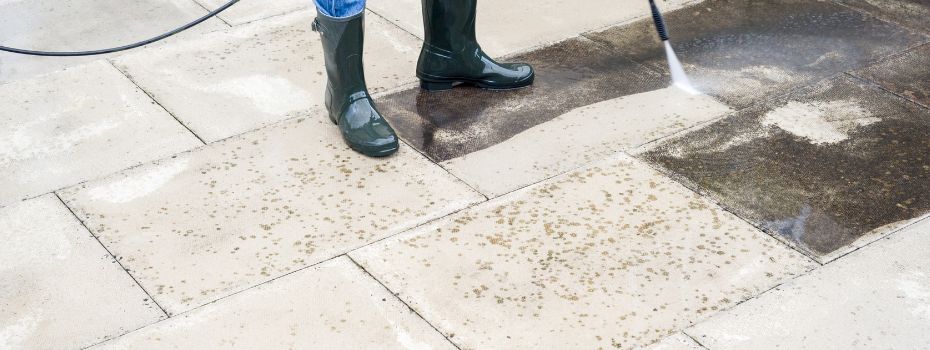
Uniwash Team provides professional patio cleaning services that achieve perfect results each time. This is because we have tools at our disposal that are only available to trained specialists in the cleaning industry, and our staff are highly skilled and experienced.
Among the methods we use, these are some of the more popular:
The amazingly versatile DOFF machine was designed and built by Stonehealth Ltd as a way of cleaning masonry and stone on older buildings without damaging delicate surfaces.
It works by sending water into a hot box, where it is heated to as much as 150º c and sprayed through a nozzle onto the surface at low pressure as superheated steam.
When the steam hits the surface it dislodges and dissolves dirt and grime before evaporating, leaving the patio surface clean and dry within a few minutes.
The DOFF system is ideal for cleaning patio slabs as it gets rid of moss, mould, algae, and lichen, and it also kills the spores and pollen that lead to this problem in the first place. What's more, it doesn't need harsh, toxic chemicals to do this.
The TORC system was also developed by Stonehealth Ltd as an improvement to the highly-popular JOS system. It was also designed for cleaning stone on older properties without causing any damage, and is, if anything, gentler than the DOFF system.
Unlike DOFF, this machine uses a swirling vortex of water, fine granulate (usually sodium bicarbonate), and a mild, non-toxic detergent. This vortex gently scours the patio surface, removing all manner of dirt and grime, including stubborn stains.
Both of Stonehealth's machines are eco-friendly options as they don't use harmful chemicals and they have a low carbon footprint. They also use far less water than a pressure washing machine, though the TORC system uses much less than the DOFF.
Pressure washers are extremely useful for cleaning all sorts of materials, including patios. However, there's a knack to using these machines: you can't simply switch it onto full power and blast away!
Some surfaces are vulnerable to damage from pressure washers, so it pays to take your time and set it to half-power. The nozzle needs to be set to a wide spray rather than a narrow jet.
The Uniwash Team team has witnessed many cases where the top of the patio slabs is scored in a series of circular rings where a thin stream of water has cut through the dirt but left the surrounding area grimy. This often happens when someone sets the nozzle to a thin jet and tries to clean their patio using a high-pressure stream of water, but they give up when the results are disappointing.
All Uniwash Team cleaning technicians are skilled in the use of pressure washers and will carry out a professional job with perfect results every time.
People often confuse jet washing, power washing, and pressure washing, and this is no surprise as even some experts use the terms incorrectly. In essence, power washing and jet washing are the same, while a pressure washer is a different type of machine.
The main difference between them is that a pressure washer generally uses cold water, while jet washing (or power washing) mostly uses hot water, sometimes with the addition of soap or a cleaning solution.
The same rules apply here as with the pressure washer: if you set the machine to a high pressure you may damage your patio slabs. However, when used with care, a jet washer can shift stubborn dirt and get your patio clean without causing the slightest bit of damage.
This method differs from the others as it mostly relies on a chemical cleaning solution.
There are several different designs, but a soft washing system is basically designed to deliver a mixture of warm water and detergents onto the surface with less pressure than a garden hose.
This solution is left in place for a while to allow the active ingredients to work, breaking down dirt, oil stains, and all types of organic matter. Biocides in the mixture make short work of moss, lichen, mildew, and algae, leaving the patio stones clean and weed-free for many months.
The soapy water is rinsed away to reveal a beautifully clean patio that anyone would be proud of.
As a professional cleaning company, we have access to patio cleaning equipment that isn't available to the general public, including various types of rotary cleaners.
There are several different machines, each suited to a range of environments and situations, and we will select the most appropriate for cleaning your patio.
These machines have rotating heads with brushes or pads attached that will gently scrub the surface clean. The pads or brushes can be flat or cylindrical, and most of these cleaners have a water tank and soap reservoir that dispense a cleaning solution that is sprayed onto the surface as the machine moves along.
Some also have in-built vacuum cleaners that suck up any debris, saving you from having to sweep this up or hose away the dirty water and soapy residue.
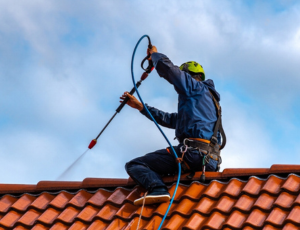
The cleaning process may vary according to the type of material and the condition of your patio. However, the basic schedule is the same, and it runs along these lines.
Final checks & Clearing up. We will give your patio a final once-over to make sure it's up to standard. The team will tidy up the tools and equipment, and the patio is all yours.
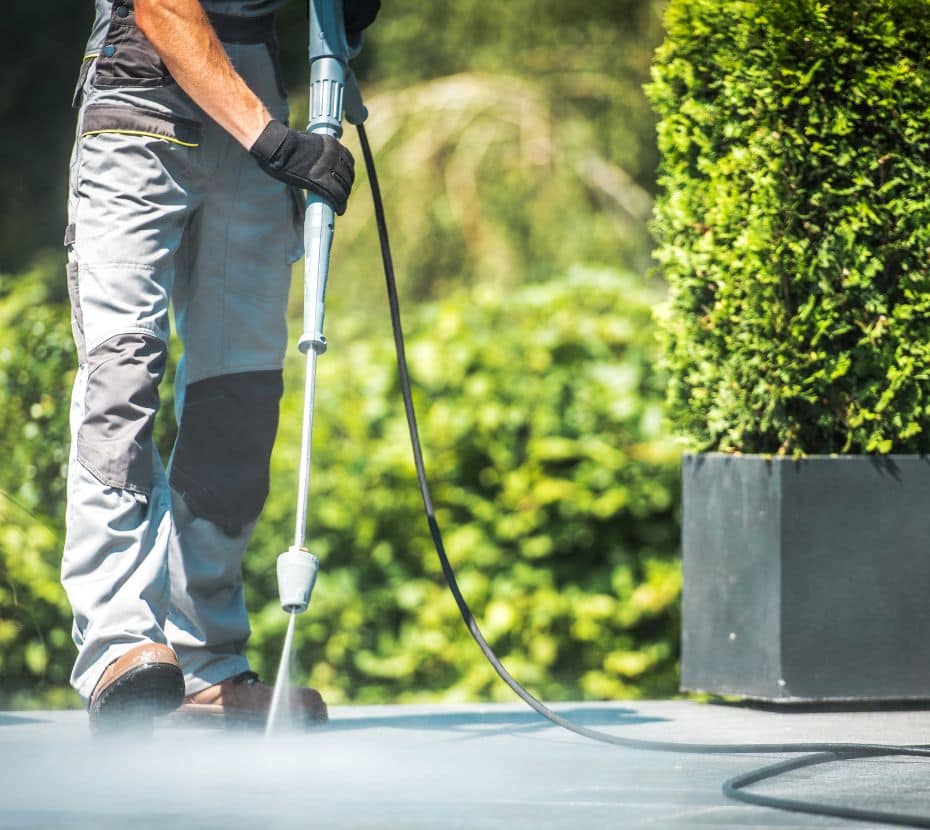



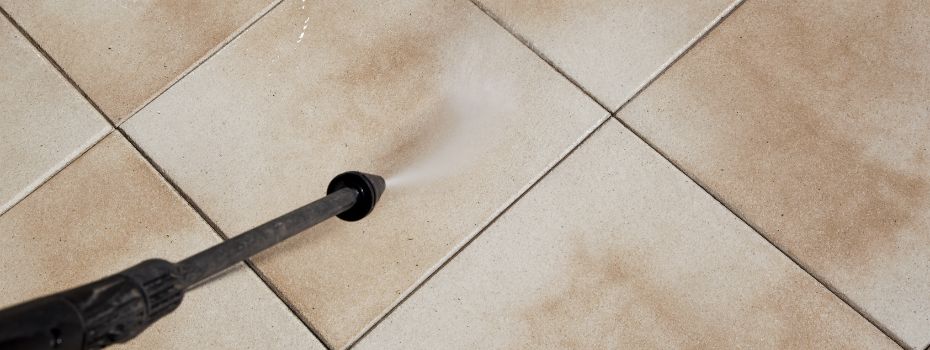
You might wonder why you need to pay someone to clean patio stones or paving slabs. After all, they're designed to be outdoors and will last for many years.
Even so, hiring a professional patio cleaner makes sense, and here's why:
First and foremost, it brings out the best in your patio area and makes it look amazing. Nobody really wants to relax on a grubby patio covered in weeds, algae, and moss! This is all the more important when you invite guests over for a barbecue or party - you want to show off your block-paving patio to its fullest.
Secondly, it keeps your patio in great condition and makes it last longer. A dirty patio is likely to have a reduced lifespan as organic growth compromises its structural integrity. The outer layers crack and crumble as acidic dirt breaks down the material, leaving it unsightly and uneven.
Algae and moss can make the surface slippery, which is a slip hazard. Falling onto the hard surface could result in hospitalisation, particularly for the very young or frail elderly.
When you're relaxing at home or entertaining guests, the very last thing that anyone wants is a traumatic accident that causes injury and ruins the experience.
The methods used by professional patio cleaning services will reduce the chances of bugs colonising the area. Spiders, ants, and creepy crawlies of all kinds will be discouraged from setting up home between the cracks or in the sand beneath the paving slabs.
Most of our methods will also kill any harmful bacteria lurking around, making your patio area safe for all.
It depends on the size of the patio, as well as the type of material, how dirty it is, and the cleaning methods we use.
For example, a large patio that's in pretty condition might cost less than a smaller patio that's caked in dirt and lichen. Essentially, the more time and effort it takes, the higher the cost will be.
There are also additional extras to consider, such as sealing the patio surface after cleaning.
If you want a better idea of our pricing structure, call us today and we'll gladly go through this with you and provide a free, no-obligation quote.
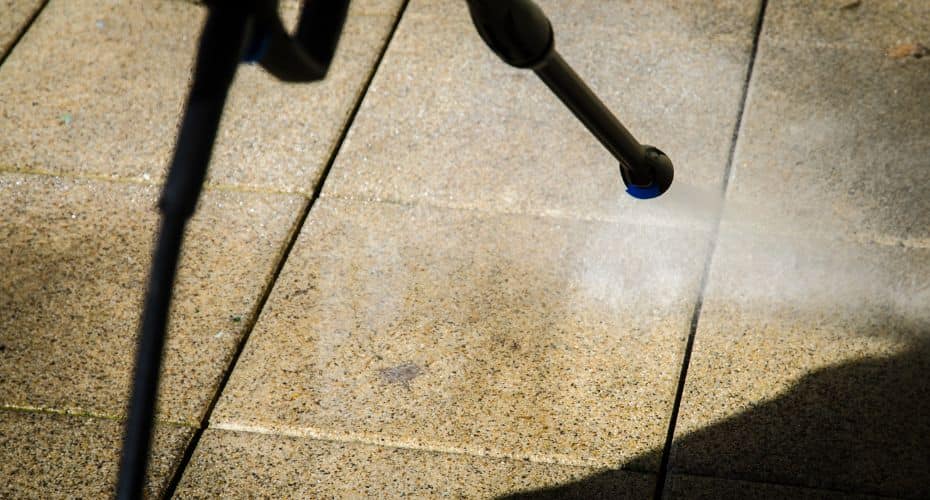

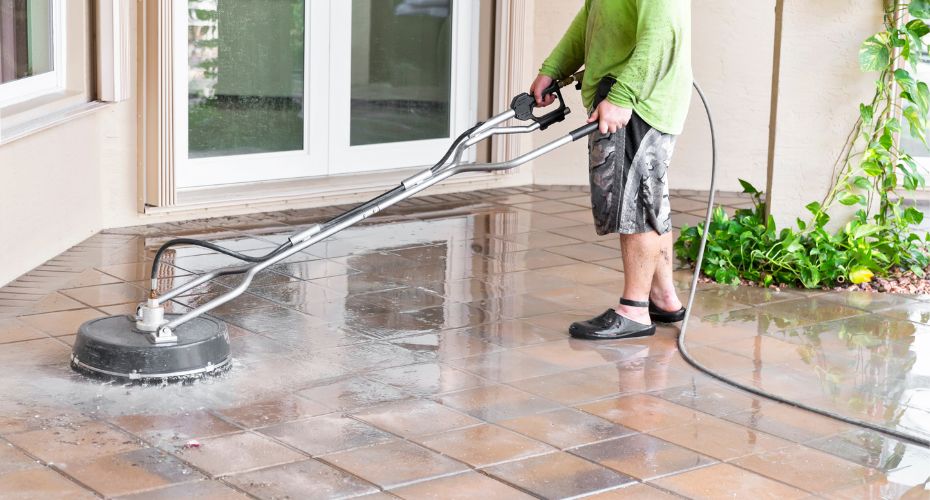
Thousands of people choose to clean their own patio rather than hire professional patio cleaners to do the job, and that's fine.
However, it can prove a thankless task with disappointing results. If you are relatively fit, prepared for some hard work, and you have invested in some good quality cleaning equipment, then you'll be okay.
Even so, Uniwash Team has a distinct advantage: we have extensive experience and access to the most up-to-date cleaning methods, tools, and equipment. While you might be content with the results of your own efforts, you can rely on us to do a very professional job and achieve perfect results every time.
Most people resort to pressure washing, but this means hiring or buying one of your own. While they can be fun to use, there is a degree of skill involved, and they aren't always easy to handle. Besides, there's a real risk of injury from flying debris or being caught by the water jet - this can cut through the skin or cause deep tissue injuries that can result in infection or even amputation!
Although a power-washed (or pressure-washed) patio can look fantastic, there's a lot that can go wrong. You can find out more in our FAQs below.
In the end, we can save you the pain, hassle, hard work, and frustration. All you need to do is to relax on your spotlessly clean patio slabs when the work is finished.

Unfortunately, you can't just leave your patio alone and expect it to look great.
If you want it to look its best for many years to come, it will need regular maintenance and care, including professional patio cleaning once in a while.
In between these times, there are several things you can do to ensure that your outdoor surfaces remain in good condition:
By following these tips, you can keep your patio looking fresh and vibrant, and help it to last for a good long time.
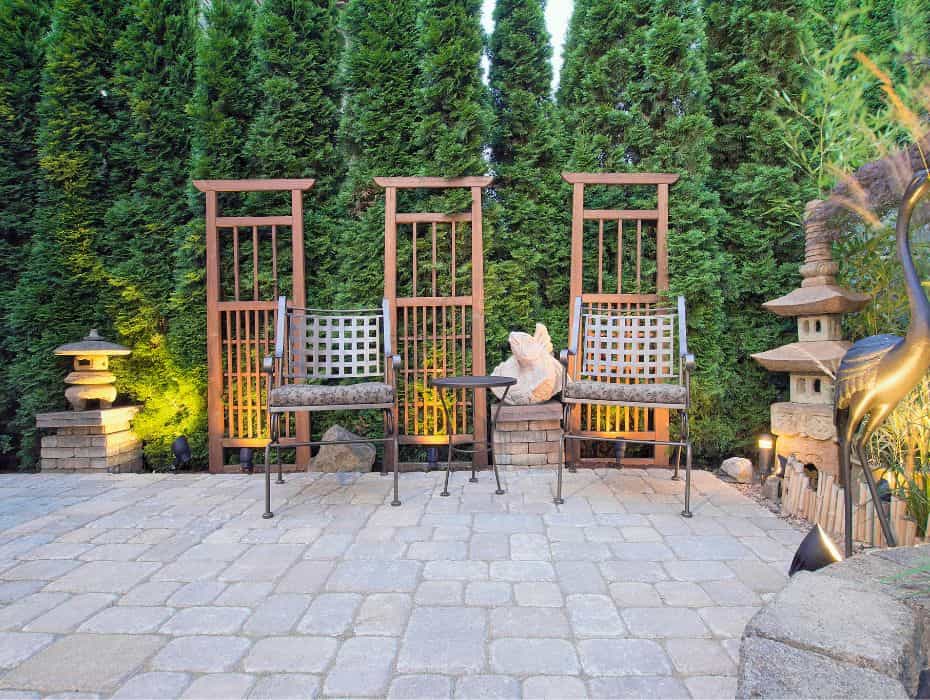
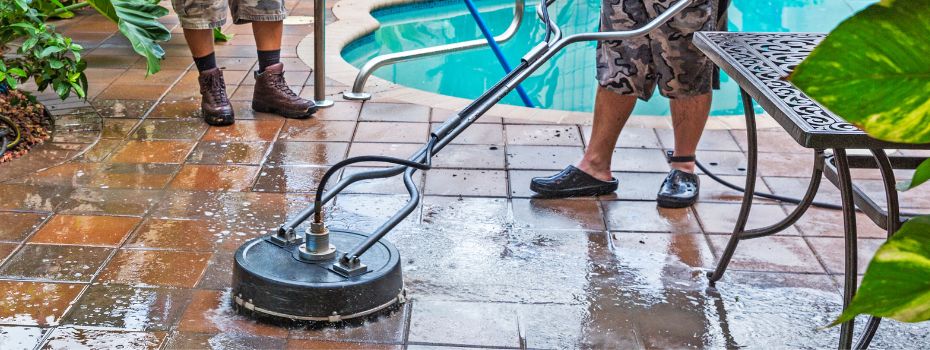
There's no hard and fast rule about sealing patio surfaces, but we recommend this in the majority of cases. However, it's not black and white, and there are several pros and cons to consider.
Sealing your patio will save you a lot of bother and frustration, whether it's concrete, paving slabs, or flagstones.
Here are some of the benefits:
And in the interests of fairness, here are the possible downsides:
While it's clear that there are many advantages to applying a sealer to your patio, we understand that you might have your doubts, considering the potential negatives.
However, most of these can be overcome by allowing us to select and apply the sealer after we have finished cleaning your patio. We know exactly which sealer is the right one for your patio, our cleaning technicians are experienced enough to know how to handle these chemicals with care, and we can acquire the sealers at trade prices, including the application in your final patio cleaning costs.
This saves you the hassle, reduces the cost, and lets you enjoy all the benefits!
When your patio is looking weathered and is caked in grime, algae, moss, and muck that's been baked hard by the sun, it's time to get in touch with the Uniwash Team.
Our fantastic cleaning service is more than a match for any dirty surface, and the team will have your patio spotless before you know it.
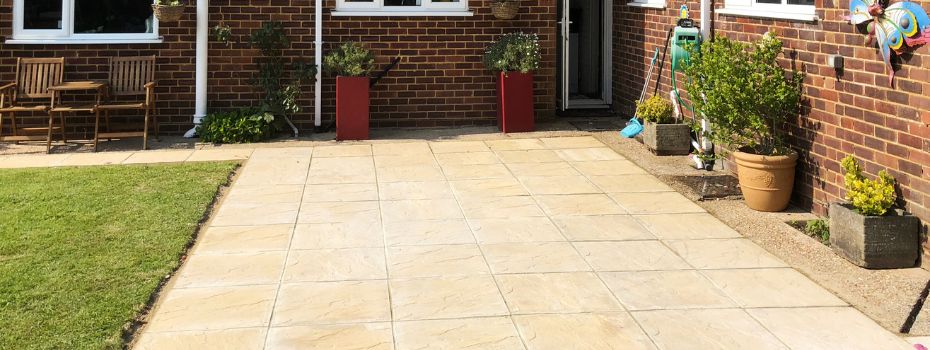
We don't just offer professional patio cleaning services. Our repertoire includes an extensive range of other options, such as:
As you can see, this covers many different areas, and you can be sure that in each case our team will do an amazing job.
We use the best equipment and keep on top of the latest training, including health and safety guidelines. All staff are fully insured and hold the relevant certificates for any technical equipment they use.
Finally, all work carried out is covered by our warranty for your peace of mind (please contact us for details on the terms and conditions).
Whether you want your patio pressure washed, your driveway cleaned or graffiti removed, we are waiting to take your call.
Whatever the nature of your cleaning requirements, we will apply our knowledge, expertise, and specialist equipment to provide an excellent service.

Ideally, you should use a professional patio cleaning service at least once a year. In between this, be sure to use our tips above to keep it in great shape and help it to last longer. If the dirt isn't too bad when we visit, the session will be quicker and therefore cheaper.
Pressure washing is a great way to clean patio slabs and other hard surfaces, although you need to take precautions. A high-pressure jet of water can cause a lot of damage to some types of material and will definitely remove sand or grout from between paving stones. The pressure washer must be set to about half-pressure and the nozzle adjusted to a spray setting. If you have any doubts or you're not confident about using a pressure washer, always leave it to the experts!
Although bleach is widely recommended as a patio cleaner, you need to be very careful when cleaning paving slabs, especially coloured block paving. Bleach can discolour some materials, will etch into the surface, and will also strip away any protective sealant that has been applied. Aside from this, it is harmful to the environment, reacting with organic materials to form highly toxic carcinogenic compounds. On the whole, it's best avoided if possible.
Patio cleaning typically takes a professional cleaner about half a day for an average-sized paved area. The total time taken will depend on the method used and the condition of the patio material.